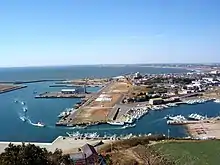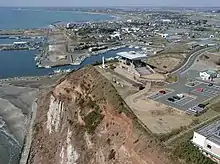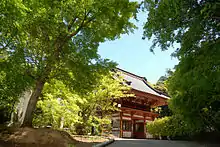Asahi, Chiba
Asahi (旭市, Asahi-shi) is a city located in Chiba Prefecture, Japan. As of 1 December 2020, the city had an estimated population of 64,690 in 26,510 households and a population density of 500 persons per km².[1] The total area of the city is 129.91 square kilometres (50.16 sq mi).
Asahi
旭市 | |
|---|---|
 Asahi City Hall | |
 Flag  Emblem | |
 Location of Asahi in Chiba Prefecture | |
 Asahi | |
| Coordinates: 35°43′N 140°39′E | |
| Country | Japan |
| Region | Kantō |
| Prefecture | Chiba |
| Government | |
| • Mayor | Tadanao Akechi |
| Area | |
| • Total | 129.91 km2 (50.16 sq mi) |
| Population (December 1, 2020) | |
| • Total | 64,690 |
| • Density | 500/km2 (1,300/sq mi) |
| Time zone | UTC+9 (Japan Standard Time) |
| -Tree | Japanese Black Pine |
| - Flower | hydrangea |
| Phone number | 0479-62-1212 |
| Address | 1920 Banchi, Asahi-shi, Chiba-ken 289-2595 |
| Website | Official website |

Geography
Asahi is located in far northeastern Chiba Prefecture, approximately 50 kilometers from the prefectural capital at Chiba and 80 to 90 millimeters from central Tokyo. Located at the northern end of the Kujukuri Plain, the southern part faces Kujukuri Beach and the Pacific Ocean, and the Shimōsa Plateau extends to the northern part.
Climate
Asahi has a Humid subtropical climate (Köppen Cfa) characterized by warm summers and cool winters with light to no snowfall. The average annual temperature in Asahi is 15.0 °C. The average annual rainfall is 1559 mm with September as the wettest month. The temperatures are highest on average in August, at around 25.8 °C, and lowest in January, at around 5.2 °C.[2]
Demographics
Per Japanese census data,[3] the population of Asahi has remained relatively steady over the past 70 years.
| Year | Pop. | ±% |
|---|---|---|
| 1920 | 45,595 | — |
| 1930 | 48,776 | +7.0% |
| 1940 | 51,473 | +5.5% |
| 1950 | 66,204 | +28.6% |
| 1960 | 64,226 | −3.0% |
| 1970 | 61,136 | −4.8% |
| 1980 | 65,405 | +7.0% |
| 1990 | 69,800 | +6.7% |
| 2000 | 71,176 | +2.0% |
| 2010 | 69,074 | −3.0% |
History
The Chiba clan, or branches of it, ruled the Shimōsa region for about 400 years from the Kamakura period. During the Sengoku period, the Chiba clan gained the protection of such powerful clans as the Odawara Hōjō clan, allowing them to get a stronger foothold over the area. They lost control when the Hōjō clan was overthrown in 1590 by Toyotomi Hideyoshi. After that, General Kiso Yoshimasa settled in the region. He restored the Ajito Castle, which was the inspiration for the name "Asahi." When poet Nonoguchi Takamasa visited the area in 1852, he wrote a poem about the general, from which the name "Asahi," which can mean "rising sun," was taken:
"from Shinano / adoring the rising sun / he came to the eastern land / and there remains the evidence of his earthly life"
In the Edo period, various agricultural changes in the region occurred. The first was the reclamation of the "Sea of Camellias", a vast lake, which was drained into the Pacific Ocean to create the fertile Higata Hachiman-goku. The second was spurred on by the arrival of agrarian scholar Ohara Yugaku in 1835 and other kokugaku scholars who helped to revive agriculture in the area. During this same time, while Iioka Sukegoro was helping to develop the fishing industry, fishermen from the Kansai region moved to the area to take advantage of the bountiful fishing grounds available.[4]
The town of Asahi was established with the creation of the modern municipalities system on April 1, 1889. It was raised to city status on July 1, 1954. On July 1, 2005, Asahi absorbed the town of Hikata (from Katori District), and the towns of Iioka and Unakami (both from Kaijo District) .
The city was damaged during the March 2011 Tōhoku earthquake and tsunami. Around 15 people were killed, 2,265 buildings were damaged, with 427 buildings destroyed, 716 people were left homeless, and heavy damage was done to the town's port and fishing boat fleet.[5]
Government
Asahi has a mayor-council form of government with a directly elected mayor and a unicameral city council of 20 members. Asahi contributes one member to the Chiba Prefectural Assembly. In terms of national politics, the city is part of Chiba 10th district of the lower house of the Diet of Japan.
Economy
The local economy is dominated by commercial fishing, agricultural and seasonal tourism to its beach resorts.
Agriculture
Asahi City's agricultural output is ranked first in Chiba Prefecture and ninth in Japan. The city's location on the coast of the Bōsō Peninsula gives it easy access to abundant fishing grounds created by the intersection of the Japan Current and the Okhotsk Current. Iioka fishing port has the second highest volume of fish unloaded in Chiba Prefecture.[6]

Flowers
- Cyclamens
- Garland Chrysanthemum
- Petunia
- Transvaal (Bellis perennis)
- Rapeseed
Fruits, Vegetables, and Grains
- Cherry tomatoes
- Cucumbers (including heart-shaped and star-shaped[7])
- Mushrooms
- Parsley
- Pickling Melons (Muskmelon)
- Rice
- Slender green peppers
- Strawberries
- Takami Melons
- Tomatoes
- Zucchini
Seafood and Meat
Education
Asahi has 15 public elementary schools and five public middle schools operated by the city government, and two public high schools operated by the Chiba Prefectural Board of Education.
High schools
- Chiba Prefecture, Asahi City Agricultural High School
- Chiba Prefecture, Toso Technological High School
Junior high schools
- Asahi City First Public Junior High School
- Asahi City Second Public Junior High School
- Hikata Public Junior High School
- Iioka Public Junior High School
- Unakami Public Junior High School
Elementary schools
- Chuo Public Elementary School
- Chuwa Public Elementary School
- Higata Public Elementary School
- Iioka Public Elementary School
- Kojo Public Elementary School
- Kotoda Public Elementary School
- Kyowa Public Elementary School
- Manzai Public Elementary School
- Omei Public Elementary School
- Sangawa Public Elementary School
- Takisato Public Elementary School
- Tomiura Public Elementary School
- Toyohata Public Elementary School
- Tsurumaki Public Elementary School
- Yasashi Public Elementary School
Transportation
Railways
The Shiosai Limited Express service stops at Asahi and Iioka stations.
Highways
City Landmarks

Administered by Chiba Prefecture
- Chiba East Prefectural Library
- General Sports Center, Toso Stadium
- Iioka Gyobu Misaki Observatory and Lighthouse
- Toso Culture Center
Administered by Asahi City
- Asahi Chuo Hospital
- Asahi City Public Library
- Asahi Sports-no-Mori Park
- Asahi Park Golf Course
- Fukuro Park
- Iioka swimming area
- Manzai Nature Park
- Ohara Yugaku Memorial Hall and Historical Park
- Taki-no-Sato Nature Park
- Unakami Community Athletic Park
- Unakami Camp Park
- Yasashigaura swimming area (nicknamed "The Mecca of Surfing"[8])
Temples and Shrines

- Kamakazu Ise Daijin-gū
- Kumano Shrine
- Rai Shrine
- Ryūfuku-ji
- Tamasaki Shrine
Other
- Kampo no Yado hotel and hot springs (run by Japan Post Holdings)
Events
Annual
- Iioka Shiosai Marathon – first Sunday of February
- Fukuro Park Cherry Blossom Festival - April 1 - May 5
- Asahi Iioka Port / Seafood Festival - end of May
- Iioka Fireworks Festival – last Saturday of July
- Iioka "YOU You" Festival – last Saturday and Sunday of July
- Summer Fest at Yasashigaura - beginning of August
- Citizens' Tanabata Festival – August 6 and 7
- Asahi Beach Sand Sculpture displays
- Hebizono-deshimizu Cosmos Festival - beginning of October
- Ikiiki Asahi Citizens' Festival - middle of October
- Hikata Furusato Festival - middle of November
- Unakami Industry Festival - end of November
Other
- 2010 National Sports Festival of Japan Table Tennis tournament (Held at Sports-no-Mori Park from September 30 to October 4)
- Goshinkosai Festival at Kumano Shrine (held every 12 years)
- Goshinkosai Festival at Dairi Shrine (held every 33 years)
- Miroku-sanbaso procession of Kurahashi (held every 20 years)
Sister and Friendship Cities
 - Chino, Nagano Prefecture (Sister City) [9]
- Chino, Nagano Prefecture (Sister City) [9] - Nakagusuku, Okinawa Prefecture (Friendship City)[9]
- Nakagusuku, Okinawa Prefecture (Friendship City)[9]
Mascots
Asahi City uses characters from Tetsuya Chiba's manga works as official mascots, including Mukai Taiyo from "Ashita Tenki ni Naare" as the mascot of Asahi Park Golf Course.[10] Framed art and messages from Tetsuya Chiba can be seen in many public buildings. Tetsuya Chiba lived in Asahi (then Iioka-machi) during his childhood.[11]
Noted people from Asahi
- Noriko Arai, Paralympic athlete
- Hiromichi Ishige, professional baseball player
- Shoya Tomizawa, professional motorcycle racer
References
- "Isumi city official statistics" (in Japanese). Japan.
- Asahi climate data
- Asahi population statistics
- "Archived copy" (PDF). Archived from the original (PDF) on 2011-06-13. Retrieved 2009-06-18.CS1 maint: archived copy as title (link)
- Fukue, Natsuko, "Tsunami came late to unprepared Chiba", Japan Times, 30 March 2011, p. 2.
- "Archived copy" (PDF). Archived from the original (PDF) on 2011-06-13. Retrieved 2009-06-10.CS1 maint: archived copy as title (link)
- indd Archived June 13, 2011, at the Wayback Machine
- VIEW 旭市勢要覧2008 ASAHI GEOGRAPHY 大地の恵みとともに Archived May 15, 2011, at the Wayback Machine
- "Archived copy" (PDF). Archived from the original (PDF) on 2011-06-13. Retrieved 2009-06-06.CS1 maint: archived copy as title (link)
- VIEW 旭市勢要覧2008 あさひパークゴルフ場 Archived May 15, 2011, at the Wayback Machine
- "Archived copy". Archived from the original on 2009-05-31. Retrieved 2009-06-10.CS1 maint: archived copy as title (link)